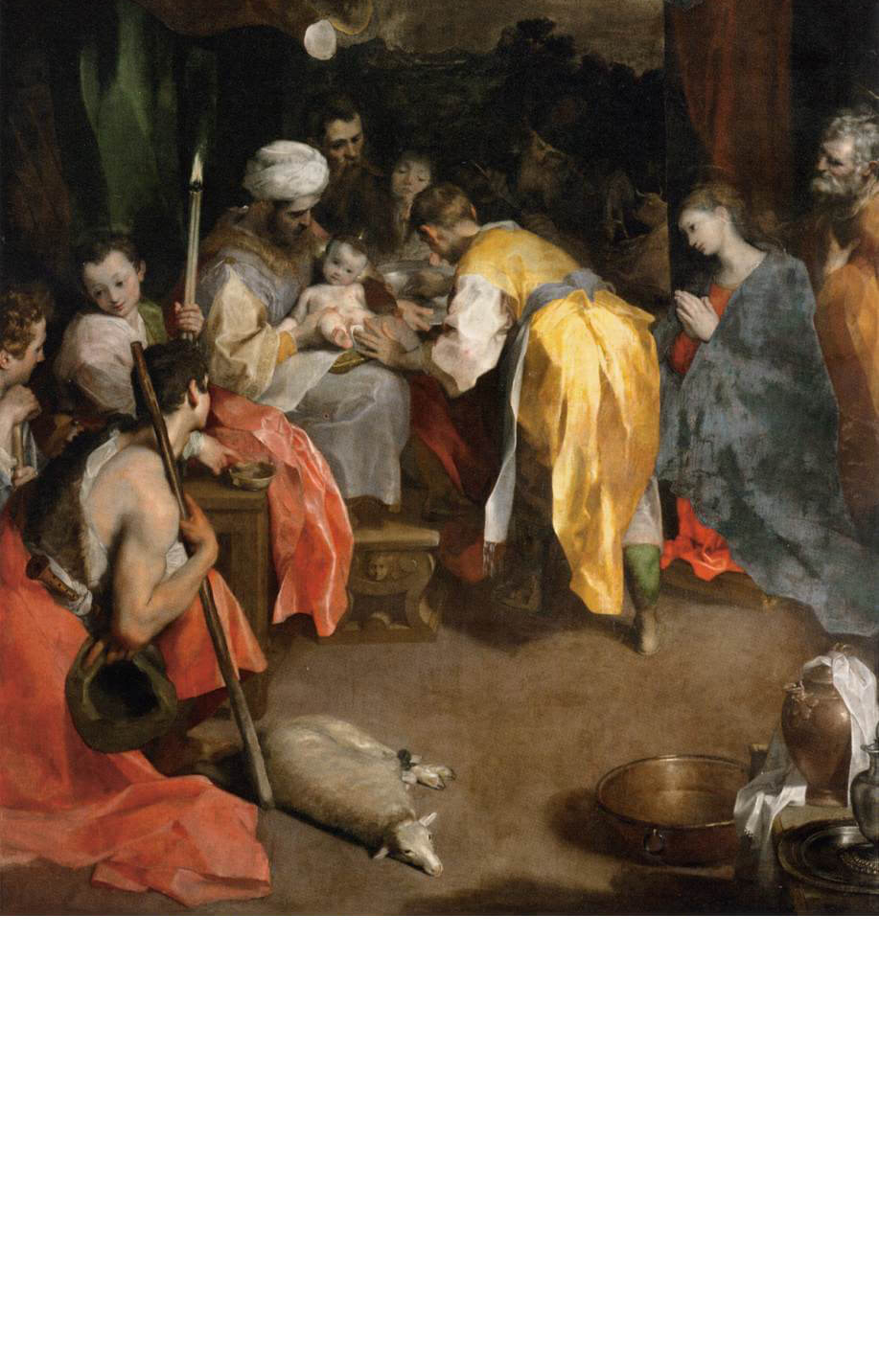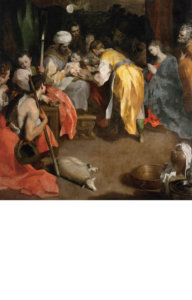Octave of the Nativity: Depend on God in a new year of Salvation
Merry Christmas to you all on this Octave of the Nativity of Our Lord. In her wisdom Holy Church knows that we need time to rest within the liturgical celebration of awesome mysteries of our salvation: the Lord’s Birth, His […]


Merry Christmas to you all on this Octave of the Nativity of Our Lord. In her wisdom Holy Church knows that we need time to rest within the liturgical celebration of awesome mysteries of our salvation: the Lord’s Birth, His future Sacrifice, and the Divine Motherhood of Mary. We have this pause as the liturgical clock stops so that we can consider the feast from different perspectives and, thereby, benefit more readily from its recurrence. Moreover, I wish you all a happy New Year of Salvation and more. That is, I pray for you a happier year than we have recently experienced. In the vicissitudes of this vale of tears there will be hardships and challenges, ups and downs, but we can and must rely with confidence on the graces God will extend to us to fulfill our role in his ineffable plan. Let us enter 2023 with joyful hope and gratitude.
Liturgically, on this Octave of Christmas in the Vetus Ordo, we reprise much of the Mass formulary of last week, the Feast of the Nativity. In the Novus Ordo the Solemnity of Mary, Mother of God is celebrated. This Sunday, coincidentally the Octave Day, the Vetus Ordo Epistle reading is the same as that which we explored last week. Moreover, the Gospel reading from St. Luke 2:21 is telegraphically brief, a single verse, underscoring the historical fact of the physical circumcision of the newborn Jesus according to the Law of Moses to which the Holy Family would be obedient, and the fulfillment of what the angel had announced to The Annunciate Virgin.
For this Sunday let’s have something different. To take some of the pressure off me this week, as I am on the road, here are some thoughts about the orations for Sunday’s Octave Mass, rather than about the readings. Over the years I’ve written on the orations many times. They are as familiar as friends.
Historically this day commemorates the moment when the Lord, without obligation, submitted to the Law of the Old Covenant and underwent the rite of circumcision, by which males became members of the People of God. This was the symbolic separation of the newly born member of God’s people from the old man and our sinful impulses. He was formally given His sacred Name. Until 1960 and Pope John XXIII’s reform, this Sunday was known as the Feast of the Circumcision, and the day retains in the Gospel reading a powerful echo of the first moment the Lord shed Blood during His earthly life.
Today is also an ancient Marian feast. Mary is the Mother of the divine Person, Jesus, not just the mother of His human nature. Since Jesus is God, Mary is the Mother of God. The Circumcision also focuses us on the role of Mary in the Lord’s Sacrifice on Calvary. At His Presentation in the temple and Circumcision, Mary with solemn joy and knowledge of future sorrow, formally offered her Lord to the Father.
Let’s hear the three proper orations for this Sunday.
COLLECT (1962MR):
Deus, qui salutis aeternae, beatae Mariae virginitate fecunda, humano generi praemia praestitisti: tribue, quaesumus; ut ipsam pro nobis intercedere sentiamus, per quam meruimus auctorem vitae suscipere.
This prayer survived in the Novus Ordo as the Collect for the Solemnity of Mary Mother of God. It is ancient, of course. It was both in the pre-Conciliar Missal and, slightly different, also in the Gelasian Sacramentary for the Assumption of Mary on 15 August (xviii Kalendas Septembris). This Collect is used on other occasions as well. For example, in the older form of the Divine Office, the Breviarium Romanum, it is prayed after singing the Marian antiphon Alma Redemptoris Mater following Compline from the 1st Vespers of Christmas until the Vespers of the Purification.
The lovely Alma Redemptoris Mater, if you’ll permit a digression, was penned by the amazing St. Hermannus Contractus of Reichenau (Herman the Cripple +1054). His feast is celebrated on 25 September. He could barely move and could hardly speak, stricken with many maladies: spina bifida, cleft palate, all sorts of illnesses. He needed a monk to help him for everything. But he had a wicked sense of humor and was admired universally. He was a genius of math, geometry, music and natural sciences. In today’s Europe his birth would have been considered unthinkable. He surely would have been aborted or euthanized. Or, worse, he might have been called an ossified unreconstructed manualist and neopelagian, a self-absorbed judgmentalist. Worst of all, he was surely a rigid backwardist. St. Herman could barely speak because of his restrictions and he suffered excruciating pain. And yet he was always joking with his fellow monks and encouraging them through adversities. Pope Leo IX and Emperor Henry III visited him and his advice was sought by prelates and authorities. St. Herman was in his person a victory over the damages of the original sin through and through. We should honor him, along with the Blessed Virgin, when we sing the Alma Redemptoris Mater along with his other stellar composition the Salve Regina.
LITERAL TRANSLATION:
O God, who by the fruitful virginity of Blessed Mary bestowed upon the human race the rewards of eternal salvation, grant, we beg, that we may perceive her interceding for us, through whom we merited to receive Your Son, the author of life.
As I said before, the Circumcision resounds deeply throughout this Mass. The Roman Station today is the ancient basilica dedicated to Mary, S. Maria in Trastevere. However, our knowledge of history reminds us that the Station used to be in even more ancient times at the basilica in the heart of Rome S. Maria ad martyres, the Catholic name of the Pantheon. The “rewards of eternal salvation” were won only through the shedding of the Son of Mary’s Blood.
The wood of the crib, the knife of the Circumcision, foretell the Cross, the nails, the lance.
In the paradoxical phrase “fruitful virginity” we approach the heart of our Christian faith. God draws everything from nothingness. He brought water from the rock in the desert, children to barren crones, great victories to tiny armies, a shepherd boy to a throne, healing to wounds. He brings life from physical and spiritual death. Fecunda virginitas encapsulates other elements of the prayer: “author of life”… “rewards of eternal salvation”.
God can bring abundance of life into and through the Church again out of whatever it is we are in right now.
We move to the silent Secret.
The wine about to be changed into the Precious Blood gleams in the chalice on the altar. The unbroken Host waits upon the white linen. This Secret was also prayed on Septuagesima Sunday. You find this oration also in your own trusty copies of the 9th century Liber Sacramentorum Augustodunensis and the 8th century Engolismensis. I couldn’t find it in the post-Conciliar editions of the Missale Romanum.
SECRET (1962MR):
Muneribus nostris, quaesumus, Domine, precibusque susceptis: et caelestibus nos munda mysteriis, et clementer exaudi.
The first part of the prayer is an ablative absolute. In the second part there is a standard et…et construction. The prayer is terse, elegant.
Mundo means “to make clean”, especially from sin, in ecclesiastical Latin texts.
LITERAL TRANSLATION:
Our gifts and prayers having been received, we beseech You, O Lord: both cleanse us by these heavenly mysteries, and mercifully hark to us.
In the Collect, Mary, the fruitful virgin, focuses us on our dependence on God, origin and goal of all being. Now we show humble confidence that God is attending to our actions. We focus on the means by which we will be cleansed from the filth of our sins, namely, the Sacrifice of Jesus, Incarnate Word, about to be renewed upon the altar. The grace is all His. The filth is all ours.
The Postcommunion is an ancient prayer, found in various old versions of the Gelasian, including the Engolismensis and Gellonensis for the August feast of St. Stephen, Pope and Martyr, with changes of course, as well as during the 4th week after Pentecost.
POSTCOMMUNIO (1962MR):
Haec nos communio, Domine, purget a crimine: et, intercedente beata Virgine Dei Genetrice Maria, caelestis remedii faciat esse consortes.
In the Lewis & Short Dictionary we find that crimen means “a judicial decision, verdict, judgment; hence, like the Greek krima, of the subject of such a decision, and with particular reference either to the accuser or to the accused”. This is related to the Latin verb cerno, “to separate, distinguish by the senses; to perceive”, etc. Think of the word “discrimination”, the ability to discern and decide between things. In the Latin liturgical dictionary I call Blaise/Dumas we find that crimen is a “crime” or “sin” especially original sin. When we start deciding things apart from God’s plan and His image written into our beings, we get mired in the filth of our sins.
A TRANSLATION (The Daily Missal – Baronius Press)
May this Communion, O Lord, cleanse us from guilt: and through the intercession of the blessed Virgin Mary, Mother of God, make us sharers of the heavenly remedy.
Communion is to be received in the state of grace. Many should not be going forward. Maybe even most, given the way the Sacrament of Penance has been nearly eradicated and forgotten far and wide. It is appropriate that, in this moment of joyful awe at transcendence, we should recall our need for cleansing. On our own, we are nothing. We get into terrible trouble. With Christ, “God with us”, Emmanuel, we are made clean and whole and given more than we lost by our own devices. The “yes” of Mary, her joy in the Birth of the Lord, her fidelity in the Presentation, her standing by the Cross, all redirect us back to the source of our cleansing, the remedy for our self-inflicted wounds.
Seek His cleansing.
Octaves are mysterious times. During a liturgical octave time is “suspended.” A lifetime is insufficient, and eternity will not suffice to contemplate the mystery the Nativity. Happily, we have these several days and not merely one to focus our minds and hearts. When we settle into the mystery, if rest in it for a while patiently we are more likely to allow God to direct our minds.
During this Octave, we must – in this time of uncertainty, on this threshold of what likely will be a harder year – give our thoughts to the magnificence of the Lord’s condescension in taking our human nature into that indestructible bond with His divinity in order to save us from our sins and teach us more fully who we are. We can learn from Our Blessed Mother how to contemplate the Lord. We learn about our dependence on Him and our own inadequacy, beautiful as we are as God’s images, a little less than angels, crowned in glory and honor (cf. Ps. 8:6). Our Mother constantly directs our gaze to the only source of saving grace.














